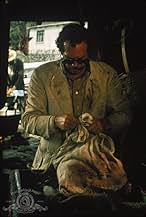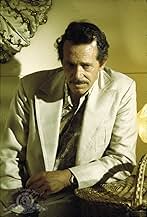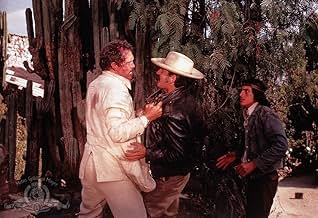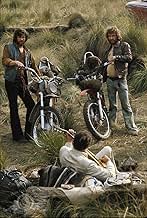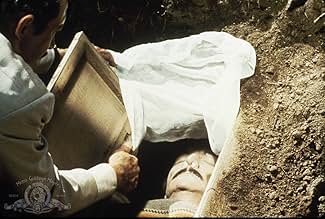An American barroom pianist and his prostitute girlfriend go on a trip through the Mexican underworld to collect the bounty on the head of a dead gigolo.An American barroom pianist and his prostitute girlfriend go on a trip through the Mexican underworld to collect the bounty on the head of a dead gigolo.An American barroom pianist and his prostitute girlfriend go on a trip through the Mexican underworld to collect the bounty on the head of a dead gigolo.
- Director
- Writers
- Stars
- Awards
- 2 nominations total
Emilio Fernández
- El Jefe
- (as Emilio Fernandez)
Donnie Fritts
- John
- (as Donny Fritts)
Chalo González
- Chalo
- (as Chalo Gonzalez)
- Director
- Writers
- All cast & crew
- Production, box office & more at IMDbPro
7.422.9K
1
2
3
4
5
6
7
8
9
10
Featured reviews
A twisted and dark masterpiece
There was probably no greater director in the U.S. from 1969-1974 than Sam Peckinpah. He made seven films, ranging from classics (The Wild Bunch) to superior genre pics (The Getaway). And before his career began sliding, he had one more masterpiece in him: Bring Me the Head of Alfredo Garcia. This is the story of one man's alcohol-fueled journey into dissolution and redemption and a really strange film. Warren Oates plays Benny, a piano player cajoled by a pair of men into finding Alfredo's head. See, Alfredo impregnated the daughter of a vicious landowner, and now he wants him dead. But this isn't really what the film is about. It's more about Benny, and how his journey costs him everything. Warren Oates is wonderful as Benny, and there are some great darkly comic moments between him and the head. And this is one of Michael Medved's 50 worst movies of all time - what more of a recommendation do you require? Seriously, this is a great film.
Dark Latter-Day Western
This dark and brutal film involves Benny, an American piano player in Mexico (played by Warren Oates) who gets involved with bounty hunters searching for the head of Alfredo Garcia. The head is worth one million dollars, because Garcia got the daughter of a very wealthy and powerful man, pregnant.
The film features plenty of Sam Peckinpah's trademark slow-motion violence in some very well-staged action set pieces. The cast (particularly Oates and Isle Vega, as his Mexican girlfriend) are good, and the film conjures up a powerful atmosphere of despair and casual cruelty and violence.
The film , however, features moments of genuine tenderness between Oates and Vega. Oates plays Benny as a man on the edge. Basically decent but forced to do some pretty horrible things to survive.
Reviled by critics on it's first release, this film will prompt some strong reactions in viewers. While not one of Peckinpah's best films, his enormous talent is still visible throughout this film.
The film features plenty of Sam Peckinpah's trademark slow-motion violence in some very well-staged action set pieces. The cast (particularly Oates and Isle Vega, as his Mexican girlfriend) are good, and the film conjures up a powerful atmosphere of despair and casual cruelty and violence.
The film , however, features moments of genuine tenderness between Oates and Vega. Oates plays Benny as a man on the edge. Basically decent but forced to do some pretty horrible things to survive.
Reviled by critics on it's first release, this film will prompt some strong reactions in viewers. While not one of Peckinpah's best films, his enormous talent is still visible throughout this film.
Peckinpah's Dark Journey...
BRING ME THE HEAD OF ALFREDO GARCIA is Sam Peckinpah's most intimate and underrated film. I can think of few other films of this caliber that are as neglected or unsung.
A bizarre, sleazy film that has Peckinpah's signature trademarks - his romance with John Huston's TREASURE OF THE SIERRA MADRE, loners, Mexico at it's grittiest, slow-motion violence.
When I saw it the first few times, the film seemed to wander aimlessly at various stretches and Peckinpah's direction felt tired to me. Even though Peckinpah can still lift you two inches off the ground with his action sequences, it doesn't have the kinetic impulse running thru it like THE WILD BUNCH, STRAW DOGS, THE GETAWAY or CROSS OF IRON.
Knowing now what I do about his career, I suspect the tiredness was authentic, due to his battles with studio executives and a self- destructive life. This knowledge and the ensuing years of experiencing the picture, have taken on added meaning and enriched it for me. Bennie the down and out piano player, memorably played by Peckinpah's Bogart, Warren Oates, is a wonderful alter ego for the director.
Starring Oates and Isela Vega and a strong supporting cast which includes Gig Young, Robert Webber and Emilio Fernandez. The excellent score is by Peckinpah's best composer, Jerry Fielding.
It may take several viewings but sit back and relish the sad poetry of an authentic film artist, Sam Peckinpah.
A bizarre, sleazy film that has Peckinpah's signature trademarks - his romance with John Huston's TREASURE OF THE SIERRA MADRE, loners, Mexico at it's grittiest, slow-motion violence.
When I saw it the first few times, the film seemed to wander aimlessly at various stretches and Peckinpah's direction felt tired to me. Even though Peckinpah can still lift you two inches off the ground with his action sequences, it doesn't have the kinetic impulse running thru it like THE WILD BUNCH, STRAW DOGS, THE GETAWAY or CROSS OF IRON.
Knowing now what I do about his career, I suspect the tiredness was authentic, due to his battles with studio executives and a self- destructive life. This knowledge and the ensuing years of experiencing the picture, have taken on added meaning and enriched it for me. Bennie the down and out piano player, memorably played by Peckinpah's Bogart, Warren Oates, is a wonderful alter ego for the director.
Starring Oates and Isela Vega and a strong supporting cast which includes Gig Young, Robert Webber and Emilio Fernandez. The excellent score is by Peckinpah's best composer, Jerry Fielding.
It may take several viewings but sit back and relish the sad poetry of an authentic film artist, Sam Peckinpah.
Unrivaled.
It is my humble opinion that Bring Me the Head of Alfredo Garcia comes as close to capturing the maddening drive of man as any movie. That is to say that it sits at the same table as the greats, perhaps across the way from Citizen Kane or Raging Bull. If you contest this it is perhaps only because the film is not as beautiful, not as magnificent, as the rest of its ballpark. I would argue that that is partially the point.
Bennie's quest is stripped to its core so that the brutality of the film is expressive of Bernie himself. There is not a violent film with more validity for its actions than this one, it is the maddening human mind which causes deaths here. Peckinpah shows us everything that is important in this man's life and then shows us what a man is capable of doing once all that is taken away. The difference between this film and other similar films is perhaps that the movie has such humble beginnings. We build ourselves inside of Bennie. When we first meet him he is casually and happily playing the piano, quietly dreaming of settling into a different kind of love. We share a quiet picnic with him, witness his wedding proposal.
Perhaps also there has never been a chaotic killing spree that has seemed this environmental. While usually the hero goes on a rampage in a way that is appropriately heroic itself, Bennie is no hero. He is a man forced into a situation by the world around him, as it seems he is always forced into situations. Since he is never the man he wants to be it seems natural that he would become the kind of man that is the amalgamation of love and hate.
All the emotion a movie in this genre could handle.
Bennie's quest is stripped to its core so that the brutality of the film is expressive of Bernie himself. There is not a violent film with more validity for its actions than this one, it is the maddening human mind which causes deaths here. Peckinpah shows us everything that is important in this man's life and then shows us what a man is capable of doing once all that is taken away. The difference between this film and other similar films is perhaps that the movie has such humble beginnings. We build ourselves inside of Bennie. When we first meet him he is casually and happily playing the piano, quietly dreaming of settling into a different kind of love. We share a quiet picnic with him, witness his wedding proposal.
Perhaps also there has never been a chaotic killing spree that has seemed this environmental. While usually the hero goes on a rampage in a way that is appropriately heroic itself, Bennie is no hero. He is a man forced into a situation by the world around him, as it seems he is always forced into situations. Since he is never the man he wants to be it seems natural that he would become the kind of man that is the amalgamation of love and hate.
All the emotion a movie in this genre could handle.
yikes
Sam Peckinpah's hallucinatory bloodbath was considered career suicide when released in 1974; today, this scuzzy, squirrelly road movie looks less like self-parody than self-autopsy. As such, it has aged better than some of Peckinpah's more "reputable" movies. Like John Cassavetes' THE KILLING OF A CHINESE BOOKIE and Brian DePalma's BLOW OUT, it's a thinly veiled allegory about the muck a filmmaker will wade through to get his movies made. Peckinpah's stand-in is Warren Oates, an actor who always brought a rotgut reek of authenticity to his roles; here, he's a washed-up pianist who stands to score a bundle if he completes one simple task--fetching the severed head of the yutz who impregnated a Mexican warlord's daughter. When Oates isn't defending his not-unwilling girlfriend (Isela Vega) from rapists Kris Kristofferson and Donnie Fritts (!), he's carrying on a boozy, uh, tête-à-tête with the brown-bagged head on an endless drive down Mexico way. But Oates isn't the villain--that distinction is reserved for the effete suits (the slimy duo of Gig Young and Robert Webber) on his tail. Oates is just a guy trying to maintain enough of his integrity to see a dirty job through: He's one of those screw-you Peckinpah heroes who completes his assignment just so he can wage war on his bosses. The movie has such a gritty, oozing, flyblown feel you could swear it was shot on No-Pest Strips instead of celluloid, and as Oates bears down on oblivion it slows to a druggy crawl: Each cut is like a dying man's blink. No matter-in its sick, ornery way, this is one of the director's most personal movies, and worthy of far better than its laughingstock status.
Did you know
- TriviaAccording to Gordon T. Dawson, principal photography was marked with an overwhelming sense of melancholy and defeat, perhaps engendered by Sam Peckinpah's use of cocaine (introduced to him by Oates). The screenwriter (a veteran of several Peckinpah films) was so unnerved by the shift in Peckinpah's mental state and mercurial behavior that he resolved never to work with him again.
- GoofsAs Bennie crosses inside his apartment, alone, and talks to Alfredo's head, a crewman in black clothing is visible, ducking behind an adjacent transom. His arm reappears a second later, as Bennie reaches for a bottle in the pantry.
- Crazy creditsThere are only three credits at the beginning of the film: The production credit, the two stars, and the story/screenplay. Everything else is at the end, and the film's title is the very last credit.
- ConnectionsFeatured in Sam Peckinpah: Man of Iron (1993)
- SoundtracksBennie's Song
by Isela Vega
- How long is Bring Me the Head of Alfredo Garcia?Powered by Alexa
Details
- Release date
- Countries of origin
- Languages
- Also known as
- Tráiganme la cabeza de Alfredo García
- Filming locations
- Production companies
- See more company credits at IMDbPro
Box office
- Budget
- $1,500,000 (estimated)
- Gross worldwide
- $19,418
Contribute to this page
Suggest an edit or add missing content



